It's easy to feel lost and confused when big things happen, especially when they impact our money and future. I remember when my dad lost his job during a slowdown years ago. My mom, usually so bubbly, seemed to carry a weight on her shoulders. We all felt uncertain. It wasn's just about not having enough money for a new bike; it was about the feeling of not knowing what was coming next. That feeling of uncertainty is what I want to explore with you. The recent economic challenges, the talk of recessions and financial crises, can be overwhelming. It’s easy to feel powerless, like it's all happening to us, and we have no control. That's why I'm putting together this curated list of books – not to scare you, but to help you understand what's going on, to empower you with knowledge, and hopefully, to ease some of that feeling of being lost at sea. We’re going to break down the events, learn from the past, and consider what might be ahead.
House of Debt: How They (and You) Caused the Great Recession, and How We Can Prevent It from Happening Again
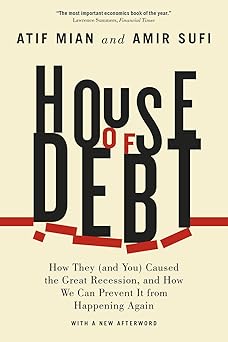
The Great American Recession was a devastating time for millions of Americans, with the loss of eight million jobs and over four million homes lost to foreclosures between 2007 and 2009. But what led to this economic catastrophe? A close look at the data reveals a clear connection between the rise in household debt and the subsequent economic downturn. It's hard not to think back to the days when my own family was struggling to make ends meet, and how the weight of debt can feel like a constant burden. I remember the feeling of being trapped, like there was no escape from the cycle of debt and financial stress. But what's even more worrying is that this cycle of debt and spending is not unique to the United States - the same pattern has been seen in Europe, leading to another economic malaise. The key to breaking this cycle, according to Atif Mian and Amir Sufi, lies in reducing household debt and increasing the flow of credit that benefits individuals, not just banks and creditors. Their research shows that excessive debt leads to foreclosures, causing individuals to save more, which in turn leads to less spending and a decline in production, followed by huge job losses. To prevent such cycles, Mian and Sufi propose new mortgage contracts that prioritize risk-sharing, which could have prevented the housing bubble from emerging in the first place. By taking a direct attack on debt and addressing the weaknesses in our financial system, we can prevent such crises from happening again. It's a compelling vision, and one that is thoroughly grounded in economic evidence.
Discover this book on Amazon (affiliate link)
Too Big to Fail: The Inside Story of How Wall Street and Washington Fought to Save the Financial System--and Themselves
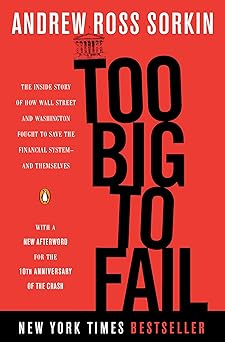
This book is a gripping account of the 2008 economic crisis, told with unprecedented access to the key players on Wall Street and in Washington. The author, an award-winning financial columnist, brings back to life the drama and turmoil of those turbulent days, revealing never-before-disclosed details. The story is one of human error and fallibility, of people making choices that had far-reaching consequences. The author's personal connection to the story is evident, as he recalls the sense of unease and uncertainty that pervaded the financial industry during this period. For anyone interested in the complex web of relationships between finance and politics, this book delivers a compelling narrative that sheds light on how the most powerful men and women in these fields decided the fate of the world's economy. The author's meticulous research and thoughtful analysis make this a captivating read, full of surprising insights and eye-opening revelations about the inner workings of the global financial system.
Discover this book on Amazon (affiliate link)
The Money Illusion: Market Monetarism, the Great Recession, and the Future of Monetary Policy
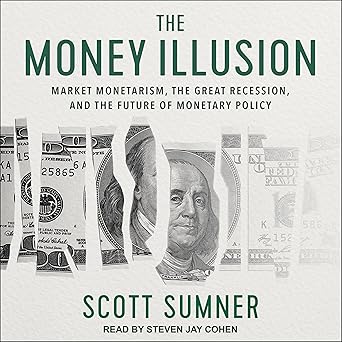
It's often the things we least expect that end up being the most profound lessons, and that's exactly what this book taught me. The author, a renowned monetary economist, sets out to challenge our understanding of the 2008 Great Recession, which was one of the most devastating economic crises in recent history. The consensus among economists was that it was caused by the housing market and banking crises, but the author argues that this was a misunderstanding. According to him, the root cause of the crisis was a mistake by the Federal Reserve in allowing nominal GDP, or the total value of all spending in the economy, to plummet. This might sound like a technical detail, but it's actually quite simple when you think about it. The author's explanation is based on standard macroeconomic concepts and is presented in a way that's easy to understand, making it accessible to anyone who's interested in economics. The book is an end-to-end case for a school of thought called market monetarism, which offers a fundamentally radical understanding of how monetary policy can work best. The author's passion for his subject is evident throughout the book, and his writing style is engaging and conversational. I was struck by how much sense the author's ideas made, and how they shed new light on a crisis that was often explained in overly simplistic terms. Overall, this book is a must-read for anyone who's interested in economics and wants to understand the world of monetary policy in a new and profound way.
Discover this book on Amazon (affiliate link)
The Courage to Act: A Memoir of a Crisis and Its Aftermath
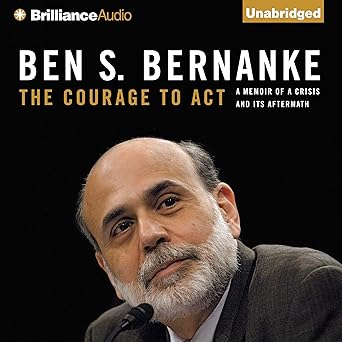
I still remember the sense of unease that had settled over our little community when the housing bubble burst in 2007. The news of the impending economic disaster was devastating, and it seemed as though the very foundations of our economy were crumbling before our eyes. But what happened next was nothing short of miraculous. Ben S. Bernanke, who had been appointed chair of the Federal Reserve just a year earlier, found himself at the helm of a crisis that threatened to engulf the entire world. With unparalleled courage and determination, Bernanke worked tirelessly alongside two US presidents to prevent a catastrophic economic failure. He called upon every ounce of his expertise, even drawing upon obscure Fed capabilities, to shore up the US economy and keep it from sinking into the abyss. It was a harrowing and heart-wrenching experience, one that pushed Bernanke to the very limits of his endurance. And yet, through it all, he persevered, driven by a deep sense of duty and a commitment to protecting the American people. With remarkable candor, Bernanke shares his story, offering a unique and unprecedented glimpse into the inner workings of the Federal Reserve during one of the most tumultuous periods in modern economic history. His narrative is a testament to the power of leadership and the unwavering commitment of a few key individuals who refused to give up in the face of overwhelming adversity.
Discover this book on Amazon (affiliate link)
After the Music Stopped: The Financial Crisis, the Response, and the Work Ahead
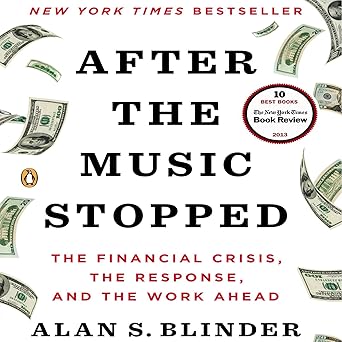
This book is a masterful narrative of the worst economic crisis in postwar American history, told with bracing clarity by a wise and experienced economic thinker. The author recounts the perfect storm of events that began in 2007, from the bursting of the housing bubble to the implosion of the bond bubble, and how these events spread throughout the interconnected global economy. I have always been fascinated by the importance of understanding economic crises, and this book has been a valuable resource for me and for many others. One of the things that struck me most about this book is the way the author explains complex concepts in a clear and accessible way, making it easy for readers to follow his argument. The author also does a great job of chronicling the government's efforts to respond to the crisis, and what we can learn from their successes and failures. What I find most inspiring about this book is the way it reveals the resilience and determination of the human spirit, even in the face of enormous challenges. The author's writing is engaging and thought-provoking, making this book an essential read for anyone interested in understanding the financial crisis and its aftermath.
Discover this book on Amazon (affiliate link)